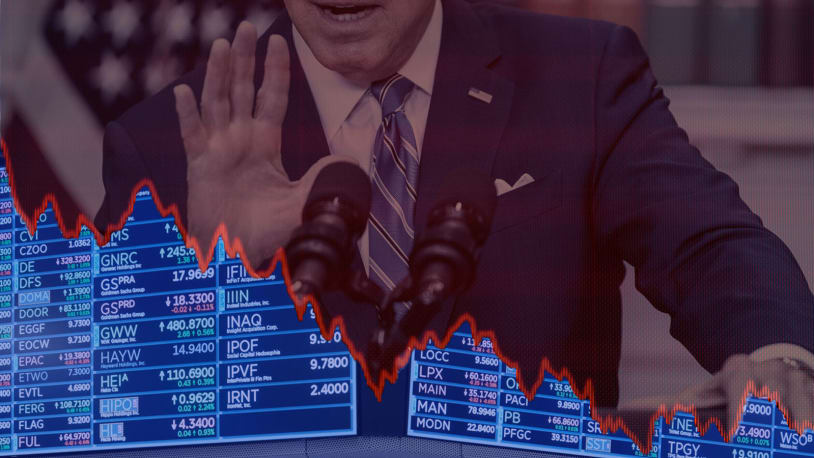
The Biden administration’s conveniently malleable definition of ‘recession’
On Thursday morning, the U.S. Bureau of Economic Analysis is expected to announce that real GDP has declined for the second quarter in a row. According to one common definition, two consecutive quarters of negative growth qualifies as a recession. The White House says the definition of a recession is more complicated than that. Republicans say the administration is playing word games to prop up Biden’s poll numbers.
The conveniently malleable definition of a recession
Last week, ahead of the release of the second-quarter GDP numbers, the Biden administration attempted to get ahead of the problem. According to a blog post on the official White House website, “While some maintain that two consecutive quarters of falling real GDP constitute a recession,” there are other factors that need to be taken into account. Conservatives were having none of it. “Apparently The White House is changing the definition of recession this week so we can pretend that we’re not in one,” Donald Trump Jr. tweeted Monday.
Newsweek fact-checker Tom Norton rated Trump Jr.’s claim “False” based on a pair of arguments. First, blog posts on whitehouse.gov frequently “make debatable claims or perpetuate mistruths” and “do not purport to be a dictionary of accepted government terms and metrics.” So, while the administration is seeking to cast doubt on what constitutes a recession, they didn’t officially change anything. And second, Norton claims that “there is no consensus among experts and authorities” as to the exact definition of a recession.
Oliver Wiseman suggested in The Spectator World that Norton might be missing the point. “Nowhere is Ronald Reagan’s famous mantra that ‘if you’re explaining, you’re losing’ truer than on economics,” he wrote. He also lumped the “recession” equivocation in with several other examples of the “[m]agical thinking” and “unserious spin” that characterize the Biden administration’s economic messaging.
The official metrics don’t matter
So are we in a recession? Treasury Secretary Janet Yellen says no. During a Sunday appearance on Meet the Press, she told host Chuck Todd she “would be amazed” if the National Bureau of Economic Research declared a recession while the labor market remains “extremely strong.”
Once again, though, it might not matter what official economic referees say. In National Review, Jim Geraghty proposed that a recession is more of a vibe than an objective state of being. “[I]n the American public’s mind, a recession is a de facto synonym for ‘economic bad times,'” he wrote. Team Biden’s biggest goal between now and November, Geraghty argued, “will be trying to convince Americans that they’re more prosperous than they feel,” though they’d probably “have an easier time convincing Americans that they’re taller than they feel.”
Geraghty also quibbled with Yellen’s characterization of the labor market, arguing that a “thriving economy” wouldn’t have 11.3 million unfilled jobs and just 6 million unemployed people to fill them.
There’s blame to go around
The Biden administration has repeatedly described skyrocketing inflation as “Putin’s price hike” while downplaying the effects of government spending. Norton gave a similar explanation, blaming “supply chain disruptions post-COVID and the conflict in Ukraine” as “global influences beyond the reach of domestic governments.”
In a New York Times piece published the same day as the White House blog post questioning the definition of “recession,” Paul Krugman admitted that he was wrong about inflation and government spending. When Biden proposed the $1.9 trillion American Rescue Plan, “[e]veryone in the debate agreed that deficit spending would stimulate demand” and “that a stronger economy with a lower unemployment rate would, other things equal, have a higher inflation rate,” Krugman wrote. What he failed to predict was just how bad that inflation would be. Krugman places some of the blame on the war in Ukraine and COVID lockdowns in China but can only speculate about why this particular stimulus package preceded a bigger inflation surge than he’d anticipated.
Sen. Elizabeth Warren (D-Mass.) argued in a Wall Street Journal op-ed published Sunday that we aren’t in a recession yet, but if we end up in one, it’ll be the Federal Reserve’s fault. “With [Fed Chair Jerome] Powell expected to announce another round of aggressive interest-rate hikes, the Fed risks triggering a devastating recession,” Warren wrote. This “Fed-manufactured recession,” she warned, would “leave millions of people — disproportionately lower-wage workers and workers of color — with smaller paychecks or no paycheck at all.”
The Wall Street Journal‘s editorial board argued on Monday that lawmakers and the Federal Reserve will need to work in tandem to resolve the inflation crisis without massive shocks to the economy. Contra Warren, the board wrote that “the Fed’s overriding duty now is restoring stable prices.” Meanwhile, Congress should focus on “restoring pro-growth tax and regulatory policies.”
On Thursday morning, the U.S. Bureau of Economic Analysis is expected to announce that real GDP has declined for the second quarter in a row. According to one common definition, two consecutive quarters of negative growth qualifies as a recession. The White House says the definition of a recession is more complicated than that. Republicans say…
On Thursday morning, the U.S. Bureau of Economic Analysis is expected to announce that real GDP has declined for the second quarter in a row. According to one common definition, two consecutive quarters of negative growth qualifies as a recession. The White House says the definition of a recession is more complicated than that. Republicans say…